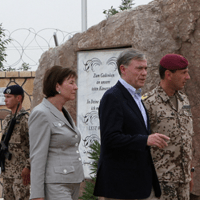Last June, German President Horst Koehler, after visiting Afghanistan, called Germany's participation in the war there vital to protecting long-term German interests. Koehler, whose role is primarily ceremonial, with little real political responsibility, told a German radio station that Germany's export-driven economy and dependency on foreign trade meant that, ". . . in an emergency, military intervention is necessary to defend . . . trade routes, or prevent . . . regional instabilities that would certainly have negative effects on [Germany's] trade, jobs and income." He then urged Germans to "look at the reality" of Germany's presence in Afghanistan and said there would likely be more German deaths before the end of the conflict. He added that it was "completely normal" for German soldiers to refer to the conflict as a "war."
Politicians and citizens of most countries with Germany's economic might and influence on foreign affairs would not blink if a high-ranking government official asserted the need to protect economic and political interests with force, or to call the conflict in Afghanistan an actual war. But Germany is not a typical world power. The criticism of Koehler's comments was immediate and intense. Thomas Oppermann, a member of the opposition Social Democratic Union, told a German magazine that Koehler was "damaging the acceptance of the [the German army's] foreign missions."
Within days of his remarks, and under pressure from his own party, the Christian Democratic Union, Koehler resigned. The episode remains the most prominent example of Germany's internal debate about the war in Afghanistan: The German army is fighting a war -- something forbidden by the German constitution -- and no one in Germany is prepared to admit it. German soldiers are fighting and dying, but Chancellor Angela Merkel, her coalition, the opposition, the media and the public refuse to acknowledge it. Germans have collectively convinced themselves that German troops are on a development and reconstruction mission when, in fact, the 4,500 German troops stationed in Afghanistan are responsible for maintaining security in Kunduz, in the north. At the same time, German intelligence agencies are engaging in a clandestine battle to gather information on radical Islamists inside Germany, and are working closely with U.S. intelligence agencies in that effort.

